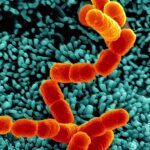Link to Pubmed [PMID] – 2093115
J. Med. Vet. Mycol. 1990;28(6):425-36
Cilofungin, a new biosemisynthetic analog of echinocandin B, inhibits the synthesis of beta-(1,3)-glucan resulting in severe modifications of the cell wall and cytoplasmic membrane of sensitive organisms. The morphological modifications to budding yeast cells, pseudomycelium, mycelium and germ tubes of Candida albicans were studied by scanning and transmission electron microscopy after 3 and 16 h exposure to cilofungin. Changes in yeast cell morphology were apparent after 3 h in 0.1 microgram ml-1 cilofungin but were more marked in 1 and 10 micrograms ml-1 cilofungin. Most of the yeasts failed to separate and formed aggregates. Cracks and discontinuities were present in the cell wall and the cell membrane became undulated and fractured. Inclusions into the periplasmalemma space were observed, along with a release of cellular components. An important inhibition of germ tube formation was noted and the structure of true mycelium and pseudomycelium was severely modified. The budding area of yeast cells was particularly susceptible to damage by cilofungin.

